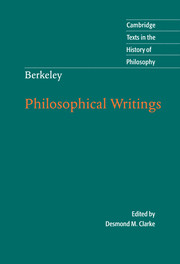Book contents
- Frontmatter
- Contents
- Acknowledgments
- List of abbreviations
- Introduction
- Chronology
- Further reading
- Note on the texts
- An Essay towards a New Theory of Vision
- A Treatise Concerning the Principles of Human Knowledge
- Three Dialogues between Hylas and Philonous
- An Essay on Motion
- Alciphron: or, the Minute Philosopher [excerpts]
- Siris: A Chain of Philosophical Reflexions and Inquiries Concerning the Virtues of Tar-Water [excerpts]
- Glossary
- Index
- Cambridge Texts in the History of Philosophy
- References
Siris: A Chain of Philosophical Reflexions and Inquiries Concerning the Virtues of Tar-Water [excerpts]
Published online by Cambridge University Press: 05 June 2012
- Frontmatter
- Contents
- Acknowledgments
- List of abbreviations
- Introduction
- Chronology
- Further reading
- Note on the texts
- An Essay towards a New Theory of Vision
- A Treatise Concerning the Principles of Human Knowledge
- Three Dialogues between Hylas and Philonous
- An Essay on Motion
- Alciphron: or, the Minute Philosopher [excerpts]
- Siris: A Chain of Philosophical Reflexions and Inquiries Concerning the Virtues of Tar-Water [excerpts]
- Glossary
- Index
- Cambridge Texts in the History of Philosophy
- References
Summary
New edition 1747
[excerpts]
For introduction to the following piece, I assure the reader that nothing could, in my present situation, have induced me to be at the pains of writing it but a firm belief that it would prove a valuable present to the public. What entertainment soever the reasoning or notional part may afford the mind, I will venture to say the other part seems so surely calculated to do good to the body that both must be gainers. For if the lute be not well tuned, the musician fails in his harmony. And, in our present state, the operations of the mind so far depend on the right tone or good condition of its instrument that anything which greatly contributes to preserve or recover the health of the body is well worth the attention of the mind. These considerations have moved me to communicate to the public the salutary virtues of tar-water; to which I thought myself indispensably obliged by the duty every man owes to mankind. And, as effects are linked with their causes, my thought on this low but useful theme led to farther inquiries, and those on to others, remote perhaps and speculative, but, I hope, not altogether useless or unentertaining.
1 In certain parts of America, tar-water is made by putting a quart of cold water to a quart of tar, and stirring them well together in a vessel, which is left standing till the tar sinks to the bottom.
- Type
- Chapter
- Information
- Berkeley: Philosophical Writings , pp. 315 - 331Publisher: Cambridge University PressPrint publication year: 2009



